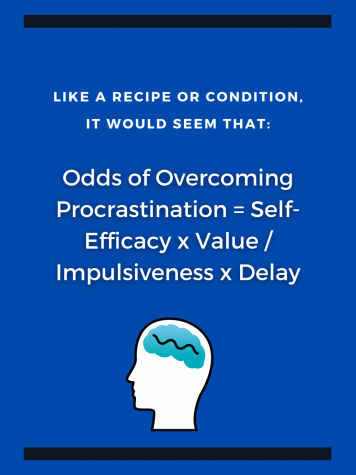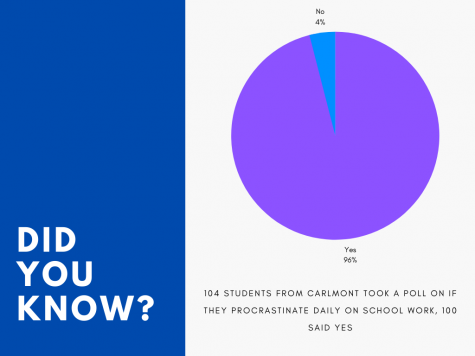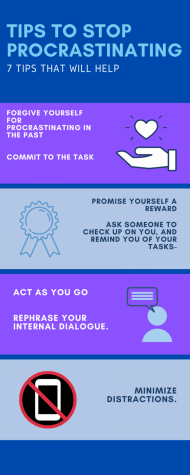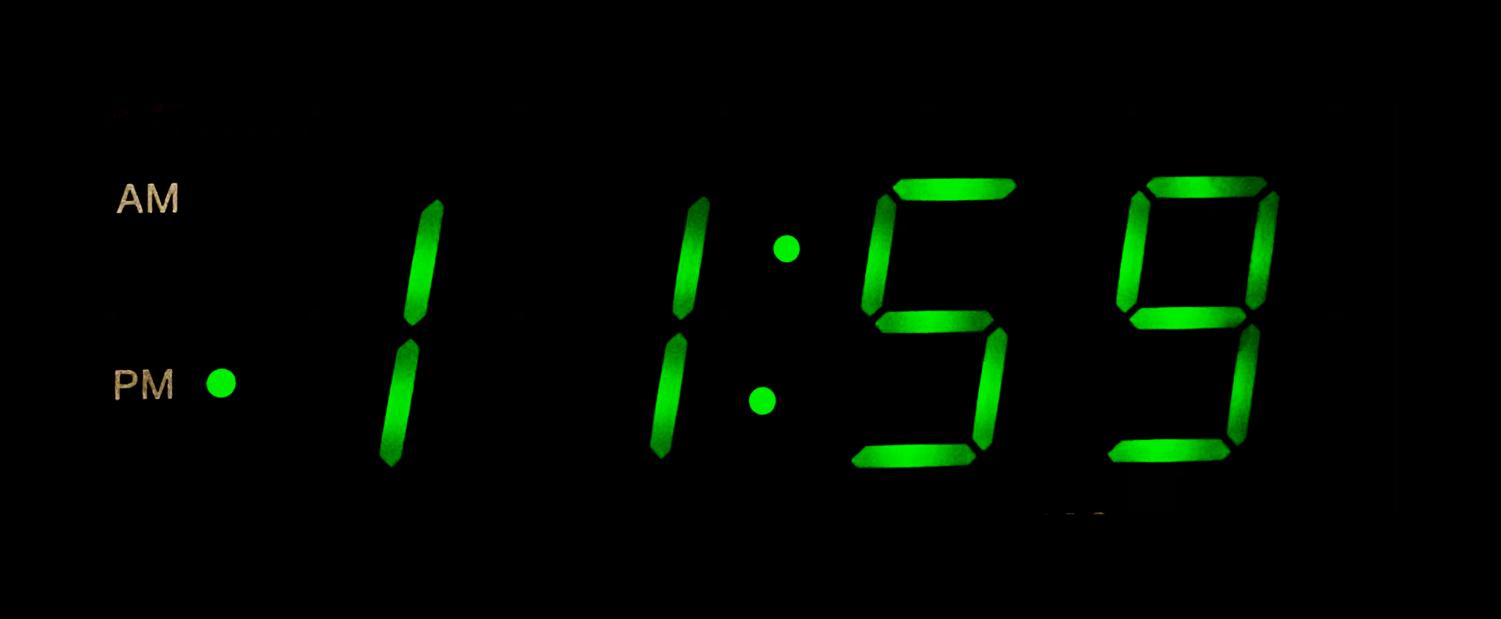Procrastination: the action of delaying or postponing something. We have all felt the pull of procrastination whether it’s pushing off a school project or not putting the laundry away. But when do procrastination habits cross the line and intersect with people’s motivation in life and disillusion?
The leading causes of procrastination, found in a 2007 meta-analysis by Piers Steel, a psychologist at the University of Calgary, reports on four primary factors that contribute to procrastination: low self-efficacy, low task value, high impulsiveness and distraction, and a long delay between task onset and completion.
Low self-efficacy relates to the confidence the person has with the task and themselves. When someone has low self-esteem towards a task, the likelihood of them doing it immediately is low.
This connects to low task value. This factor is all about the task itself and how enjoyable or difficult it is. In general, the more enjoyable the task, the less likely it is to procrastinate on it.
Sonia Duggal, a licensed therapist, has worked with past clients on the habit.
“If a task you are trying to complete is boring or too hard, and you’re dreading to do it, the chances of you pushing it off till last minute are very high,” Duggal said.
In fact, this will also contribute to difficulty keeping up concentration despite immediate and engaging distractions. Lastly, the conclusion of the four factors is a delay. How long there is in between the choice to take on a task and the moment that it must be finished. Essentially, the more you need to complete a task, the longer you’ll wait to start it.
In Steels’ book, The Procrastination Equation, he writes that our probability of opposing procrastination on a given assignment or task will be equivalent to the result of our self-viability and the estimation of the undertaking partitioned by the result of how incautious we are and the measure of postponement between taking on an errand and its due date.

This is good to know since it suggests that we might have the option to finally stop blundering around in obscurity for hit-or-miss procrastination tips and discover something that works. In particular, it might permit us to produce effective systems for beating the habit of procrastinating often.
To put it into simpler terms, pieces of our brain imagine that the errands we’re putting off – and the negative feelings associated with the task – a problem present me doesn’t have to deal with, but future me.
Ethically, we know it isn’t the best for us, but we continue to frame problems in this way because we are always the present versions of ourselves.
Many psychologists see procrastination as a coping mechanism, an emotion-focused coping strategy. People guilty of procrastination are using avoidance strategies to cope with emotions. These emotions could be stress-related. This is why, in the moment of procrastination, a “good” feeling is released.
The brain loves procrastination.
“My clinical work allows me to observe the fascination stemming from it [procrastination], and I get to see that there are actually two areas of it. One is the avoidance factor. The avoidance factor is trying to avoid something that’s difficult…and the other is stemming from ambivalence, where you’re just not certain or not sure, you want to do the task at hand,” Duggal said.
The undermining truth of avoidance is that it will eventually catch up to you.
To elaborate, the thought or feeling you are trying to avoid ends up increasing. The longer one participates in avoidance coping, the more anxiousness will be increased and struggle of self-doubt (which continues to grow the longer the avoidance method is used).
“When we are stressed or anxious, we are in some ways using that as a defense to not fail if we don’t try or do what we need to, then there’s no outcome. And there’s no failure to face,” Duggal said. “When we’re talking about stress and anxiety, it kind of, you know, fear of failure. That is the underlying motivator to avoid the task.”
Anxiety and procrastination can be two factors commonly related to each other that contribute to equalling stress.
In most cases, procrastination is not a sign of a significant problem. It’s a common tendency that most give in to at some point or another. To elaborate, procrastination can also lead (or be the reason why the habit is so strong) to mental health disorders such as depression, obsessive-compulsive disorder (OCD), and attention deficit hyperactivity disorder (ADHD).
Feelings of hopelessness, vulnerability, and an absence of energy to stay motivated can make it hard to begin or complete a simplest task. Sadness can prompt self-question. If stuck to find a way to eliminate this feeling, thoughts of just believing it is easier to put it off or not do it all together overtake. Depression can make simple tasks feel impossible.
“When you’re going through depression, you have adopted this whole new mental state and are just sitting in a dark cloud. It’s no longer avoiding the task till the last minute now, the whole task itself seems impossible to complete and there is zero motivation,” said Duggal. “But as if you spend a moment to chip away, you know, kind of break the task into bite-sized pieces and take it a piece at a time…that is, this achievement and that can be uplifting, which, again, fuels motivation.”
Duggal said depression-related procrastination is not that people are not able to do it but feel as though they are not competent enough to do any task.
Procrastination is also common in people with obsessive-compulsive disorder (OCD). OCD is often linked with maladaptive, unhealthy perfectionism, which causes fears about making mistakes and messing up doubts about whether you are doing something correctly, and worries over how others perceive you. Thus, people with OCD are likely to push off tasks in the thought of failure ahead of them if they do it incorrectly.
Many adults with attention-deficit/hyperactivity disorder (ADHD) struggle with procrastination as well. When you’re so distracted by stimuli on the outside, as well as internal thoughts, it can be hard to get started on a task, let alone finish it. This also applies if that task is difficult or not interesting to you.
Commonly found throughout the research done on procrastination, it is proven that students are also highly at risk of being affected by procrastination. Academics are a major contributor; students can overestimate how much time they have left to finish school work-related tasks, overestimate how motivated they will be in the future, underestimate the length of certain activities, or feel no motivation to complete the task.
The negative impact procrastination can have on one’s life is drastic. It is an example where procrastination becomes chronic and begins to have a seriously damaging impact on a person’s daily life that it becomes a major issue. If these instances occur, it becomes not an issue of poor time management skills, but a major part of their lifestyle.

One tip to stop procrastinating is to find out the root cause of why you procrastinate.
“I know I start procrastinating the moment I pick up my phone. I tell myself I’m just going to text my friends for help on math, which eventually leads to getting distracted on my phone,” said Anika Patidar, a senior. “Something that I found works for me is telling myself how stressed out my future self will be by staying up late at night to complete assignments I could’ve finished hours ago.”
The expanding prevalence of the idea of “future me’s problem” has permitted us to disassociate from ourselves when we’re acting poorly towards tasks: by putting something off, we eliminate the issue for our current selves and make a future issue that appears to be inaccessible.
Sophomore Megan Gattey advocated for the same reasoning as Patidar and shared her honest thoughts on schoolwork, especially during this COVID era.
“I definitely don’t think of starting homework immediately after logging off zoom, I feel burned out after my classes,” Gattey said. “Online school has made my work ethic worse, I find myself turning in assignments late because of how poor my time management is.”
Gattey does add on to a positive side she has been promoted with.
“I have found the courage to ask for help in my classes and also ask for more time. This has been helpful for me, and I am able to slowly start finishing all of my assignments.” Said Gattey.
By reaching out and asking for help Gattey is unintentionally saving herself from developing a cycle of everyday procrastination. Her basic ability to break down large projects into small tasks is a great tip.
For instance, imagine someone pays their bills late, doesn’t start working on a big project until the night before the deadline, delays gift shopping until the last minute, and even files their income tax returns late.
This adoption of a procrastination lifestyle can have a serious impact in a number of areas, including social, financial, and professional well-being.
In a study, published by the lending company RateSetter in 2015 and based on a YouGov survey of 2,000 adults, data revealed that people spent, on average, 218 minutes procrastinating every day, which amounts to 55 days of lost time each year.

With this in mind, one major tip that has helped many people decrease or even eliminate their procrastination habits is having a well-structured time schedule. By scheduling your daily activities, you provide motivation to be present and diligent in your responsibilities.
Senior Siya Verma considered this point.
“It took me a while to get the hang of a system that works for me. It’s different for everyone, but I personally find it easiest to get all of my homework/assignments done as soon as I can,” Verma said.
Verma also highlighted how she catches herself from slipping into pushing off a task.
“If I’m dreading starting an assignment or a college essay, I’ll do a bunch of benign tasks first, like checking my email, social media, and grades. But once I finally get into the groove, it’s easy for me to work for a long time,” Verma said. “I don’t really like the Pomodoro method, because my breaks end up going way longer than they should and they disrupt my workflow. If I need to give myself a break, I’ll just take a couple of minutes in between assignments to get a snack, talk to my sister, or dance to music (or something like that).”
Duggal said,“What’s really important at the end of it all is having that honest conversation with yourself. That’s what procrastination is all about, you’re playing hide and go seek with yourself, and you’re procrastinating.”
Nonetheless, as much as it is important to get things done, it’s just as important to take breaks, or we won’t be in a position to do anything at all.



